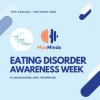rvallee
Senior Member (Voting Rights)
I don't think anyone is saying that. But weight loss is simply down to inability to eat enough food, no reason to complicate that. The cause for that is the whole question, but being unable to eat is a problem in itself, whether the cause is known or not. It's likely that the explanation for this overlaps strongly with what PEM is and how it affects the rest of the body. At least in most cases.There are no structural changes that would explain weight loss known to be part of ME.
I had a pretty bad episode recently and was barely able to eat 1K calories per day. And I'm not sure if my usual average is much more than maybe 1600-1800. It's not that big of a problem short-term, but unless something is done it's only a matter of a few weeks where it starts being a major issue that requires an expert.
It happened several years before when I was not underweight. Now I am significantly underweight, enough that 2-3 weeks of this would be seriously problematic without supplementation. That's probably where most of the serious complications come from, when the patient is already fragile and undernourished.

